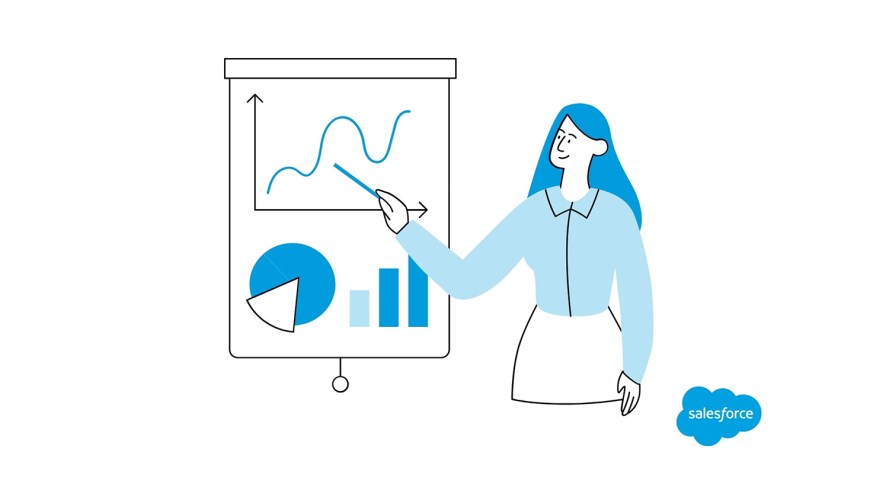What is Sales Automation? A Complete Guide

Sales automation used to be about logging and updating data. How quaint. Learn how advanced tech like AI is changing the game.
Salesforce Staff
Sales teams have come a long way since the days of Post-it notes and file cabinets. First came computers, but customer data was still hard to find and tucked away in a hundred different systems.
Then came sales automation. Now you could sync data across tools, reduce manual hand-offs, give every team access to the same data, and layer analytics on top. Good stuff. But the best part? Sales automation was just getting started.
Today, with the help of AI, it’s making yet another leap in what it can do. Below are key automation milestones: where we started, where we are now, and where we’re headed.
What you’ll learn
- What is sales automation?
- What are the benefits of sales automation tools?
- How does sales automation improve the sales process?
- Which businesses will sales automation suit?
- What is the connection between a CRM and sales automation?
- How will the sales process be automated?
- Does sales automation replace sales reps?
- How to choose the right sales automation software
- Implement sales automation software with Salesforce
What is sales automation?
In the process of generating leads, qualifying them, nurturing prospects, and converting the most promising contacts to sales, there are a number of small and labour-intensive actions that are an important and necessary part of the sales process.
Sales automation software isolates those repetitive actions and automates them using technology to save you energy and time. Examples include:
- Weekly reporting: Creates an accurate and consistent reporting cadence
- Meeting scheduling: An otherwise manual process that could save reps dozens of hours each year
- Proposal reminders: Gently help you push a sale through to the finish line
When this software has built-in AI, it can “automate activity logging, identify high-priority emails, and create new contacts for you.” Sales automation software is the tool, and artificial intelligence is the assistant that makes the tool work smarter.
Organisations use sales automation to improve the efficiency and effectiveness of their sales force. Sales automation tools minimise the need for sales reps to manually complete tasks such as data entry, allowing them to spend more time on higher value-added activities, such as building better sales decks, researching the competition, and negotiating upsells with customers.
What are the benefits of sales automation tools?
Sales automation software offers users a number of advantages. These include:
Advanced deal management
Keep an eye on the leads that have the most potential with less effort. Artificial intelligence in your sales automation tool alerts you to potential clients with the greatest chance of closing based on your company’s unique parameters.
Faster lead scoring and prioritisation
Qualify a lead automatically based on their buyer journey. Sales automation tools track the interactions prospects have with your website, social media channels, and sales reps, and they help businesses prioritise the highest-potential customers.
Smarter lead assignment distribution
AI sales software can determine the industry or territory customers belong to, making it easier to assign a prospect to the right rep.
Automated lead nurturing
Send triggered messages that add value to the customer conversation at strategic points of their decision-making process.
Accelerated response times
Surface important documents and the sales collateral your customers want and send it to them immediately. This way they don’t have to wait for you to gather it from your colleagues.
Data-backed sales forecasting
Predicting sales and understanding seasonal trends has always been part of the process. Those figures were often based on hunches, complicated spreadsheets, or manual examinations of sales data. Now, however, sales software with AI takes your sales data and creates forecasts that are an “accurate measurement and lever of growth for your business.”
Consolidated and regular reporting
When reps use the same sales platform, the platform gathers all the information about prospects and customers in a unified dashboard, which makes it easier to pull real-time reports and make data-driven sales decisions.
Smoother collaboration and communication
Do better than shared documentation; work on files simultaneously to eliminate the downtime that results from passing a file back and forth. Monitor changes, automatically notify others of updates, and request approvals with sales automation software that invites your sales team to work together.
Regular reminders for tasks
In sales, you can’t automate everything. For the manual tasks that require sales rep intervention, sales software prompts reps with reminders to complete upcoming and outstanding items so their clients’ needs remain top of mind.
Seamless scheduling
A sales automation tool helps make sure your reps never miss another appointment. It automatically fills up your calendar to minimise latency and downtime
Create faster proposals
Most CPQ software is designed to help you use smart templates to produce proposals and accurate quotes using the latest pricing parameters — even if those change on a daily basis.
How does sales automation improve the sales process?
Sales automation features enhance efficiency and productivity by automating various tasks in the sales process. These features act as reliable assistants, ensuring timely execution without requiring constant reminders. Here are some examples:
Guidance
Automated reminders and notifications keep sales teams informed about upcoming tasks, enabling deals to progress smoothly. This automation acts as a personal assistant, tracking responsibilities and reminding team members of approaching events or tasks. This reduces the chances of missed opportunities.
Lead management
By automatically analysing a lead’s behaviour, sales automation organises, scores, and prioritises leads before assigning them to the most suitable sales representative. Scoring leads manually would be time-consuming, but with software automation, this process takes minutes. The outcome is a curated list of leads, empowering salespeople to convert more prospects into paying customers.
Communication
Sales automation encompasses various communication channels, such as email, chatbots, and appointment-scheduling tools. As salespeople have limited time, customers expect quick responses. Communication automation enables companies to establish automated processes for managing customer interactions. Even if everyone in the company is occupied, customers can still receive emails, book appointments, and engage with chatbots to find the right product.
Data entry
One of the most tedious tasks for sales reps is manual data entry, such as inputting customer information into systems. Automated data entry eliminates repetitive and time-consuming tasks by automatically populating data fields like contact details and pricing models.
Record creation
Sales automation automatically creates new profiles for leads interacting with marketing materials and stores their contact information in the customer relationship management (CRM) system. This ensures easy access to contact data across all departments.
Research
Automated research scours public information, including the Internet and social media, to identify potential customers. With vast amounts of constantly updated data, research automation helps pinpoint customers with high-value potential and organises the findings for the sales team.
Activity logging
Automated activity logging tracks emails sent, meetings scheduled, and phone calls made, providing a clear view of a sales rep’s progress with a lead. By standardising and making the process repeatable, activity logging allows sales reps to see the steps taken and the remaining tasks. Automating this logging process saves sales reps from manually entering their activities.
Trends in Sales Ops Report
According to the Trends in Sales Ops report, Eight in 10 leaders and sales ops professionals with AI say it has improved use of reps’ time at least moderately. Learn how sales automation can benefit your business in our free Trends in Sales Ops resource.


Which businesses will sales automation suit?
Sales automation can benefit a wide range of businesses across various industries. Here are nine examples of businesses that can benefit from sales automation:
- E-commerce companies: Online retailers can automate lead scoring, email marketing campaigns, and customer communication to streamline their sales processes and improve customer engagement.
- B2B sales organisations: Businesses engaged in selling products or services to other businesses can automate lead generation, lead qualification, and lead nurturing processes to enhance efficiency and accelerate the sales cycle.
- Real estate agencies: Sales automation can assist real estate agencies by automating lead management, property inquiries, appointment scheduling, and follow-up communication with potential buyers or renters.
- Financial institutions: Banks, insurance companies, and other financial institutions can leverage sales automation to streamline customer onboarding, cross-selling, upselling, and financial planning processes.
- Manufacturing companies: Sales automation can help manufacturing businesses manage their sales pipeline, automate order processing, track customer interactions, and provide real-time updates on order statuses.
- Professional services firms: Sales automation can benefit professional service providers such as consulting firms, law firms, and marketing agencies by automating lead tracking, proposal generation, client communication, and project management.
- Retail chains: Sales automation can be utilised by retail chains to automate customer loyalty programs, personalise marketing campaigns, and track customer preferences and purchase history.
- Telecommunications companies: Sales automation can streamline the sales processes of telecom providers, including lead qualification, product/service configuration, contract management, and upselling/cross-selling.
- Event management companies: Sales automation can help event management businesses automate lead capture, attendee registration, ticketing, and post-event follow-up processes.
These are just a few examples, but in reality, sales automation can be beneficial to any business that relies on sales processes and wants to optimise efficiency, improve customer engagement, and increase sales effectiveness.
What is the connection between a CRM and sales automation?
CRM, or customer relationship management, is a software system that enables businesses to manage their customer interactions, store customer data, and streamline their sales processes. It serves as a central hub for organising and accessing customer information, such as contact details, communication history, purchase history, and preferences.
CRM software is closely connected to sales automation because it provides the foundation for efficient and effective sales automation. When businesses implement sales automation tools, they rely on the CRM to store and retrieve customer data seamlessly. The CRM acts as a repository of customer information, allowing automation tools to access and utilise that data to automate various sales tasks and processes.
Having a robust CRM is crucial for managing a larger volume of leads and ensuring that automation tools can retrieve the right customer data when needed. It provides the necessary infrastructure for sales automation to function optimally.
When exploring sales automation tools, businesses can choose to invest in a specific automation tool and integrate it with their existing CRM. Alternatively, they can invest in a CRM that already includes built-in automation features. In both cases, the ability to share customer data between platforms is essential to ensure a cohesive and streamlined sales process.
While the idea of investing in multiple software solutions may be daunting for new businesses, there are CRM providers that offer sales automation technology specifically tailored for small businesses. These providers understand the needs of growing companies and offer CRM solutions with integrated automation features, making it more accessible and manageable for businesses to leverage automation for their sales processes.
How will the sales process be automated?
Sales process automation works by leveraging software tools to automate various tasks and activities within the sales workflow. This presents a significant opportunity to enhance the efficiency and effectiveness of sales operations while freeing up valuable time for sales staff. Automation sales tools offer several benefits that help companies prioritise better interpersonal relationships. Here are seven examples:
1. Scheduling meetings
Automation sales tools eliminate the need for lengthy email exchanges when scheduling meetings. Prospects can view a sales rep’s calendar, select a suitable date and time, and the software automatically updates the availability and adds the meeting to the sales rep’s calendar.
2. Sending personalised emails
Email automation tools allow users to send large volumes of personalised emails. Follow-up emails, drip campaigns, and welcome messages can be automated, ensuring timely delivery with relevant personal information. Automation can also halt email sequences if the recipient takes a specific action, preventing unnecessary messages after a positive response to a call-to-action.
3. Prospecting
Automated sales tools help prioritise leads by scanning the internet for potential prospects and providing weekly or monthly lists without duplicates. Additionally, automated prospecting tools score leads, allowing sales teams to focus their efforts on high-priority contacts who are more likely to convert, saving time on less promising leads.
4. Reporting
Sales automation platforms offer the ability to create real-time reports and distribute them to specific groups or individuals. This streamlines the process of organising and reporting on key company metrics, ensuring that relevant stakeholders receive critical reports efficiently.
5. Auto-dialling
Predictive dialler software reduces downtime between sales calls, enabling sales professionals to connect with more prospects without manually dialling each number. It automates the dialling process, increasing efficiency and allowing sales reps to make more calls. Automation tools also provide features for call recording, summarisation, and logging, facilitating future reference and analysis.
6. Chatbots
AI-powered chatbots enhance customer interactions by providing instant responses to inquiries. They can answer questions, collect contact details, process payments, and provide tracking updates. Modern chatbots can be customised to match a company’s brand voice and engage in personalised conversations, adding a human touch to automated interactions.
7. Sales forecasting
Automation tools assist in creating accurate sales forecasts by utilising up-to-date data and analysing seasonal trends. This eliminates the need for manual data analysis and spreadsheet management, providing insights for predicting future growth.
By leveraging these automation sales tools, companies can optimise their sales processes, reduce manual effort, and allocate more time to building meaningful relationships with prospects and customers.
Does sales automation replace sales reps?
Sales automation does not replace sales reps. The sales industry remains heavily reliant on human interaction, particularly in B2B relationships. While sales automation can alleviate some tasks performed by sales reps, it cannot entirely substitute the human element.
Despite significant technological advancements, the ability to build and establish trust through human behaviour is still unparalleled. Automation, however, presents an exciting opportunity for sales reps to leverage their personal qualities more effectively. With automation handling time-consuming tasks, sales reps gain additional time and opportunities to engage with customers in a manner that reinforces positive and enduring relationships.
How to choose the right sales automation software
Choosing the best marketing automation software requires careful consideration. Here are the steps to guide you in the selection process:
Evaluate the software’s ease of use
- Ensure the software’s interface is user-friendly and intuitive.
- Look for screenshots or demos to gauge the simplicity and navigation of the user experience.
- Check if the provider offers comprehensive customer support, including knowledge bases and tutorials.
Explore analytics and reporting options
- Determine if the software provides robust analytics and reporting features.
- Assess its ability to track metrics relevant to your business and measure the success of your campaigns.
- Consider if advanced reporting capabilities, such as personalised dashboards or automatic email reports, are necessary for B2B or enterprise environments.
Research integrations
- Evaluate how well the marketing automation software integrates with your existing stack of tools.
- Assess the compatibility and data management capabilities of the software.
Consider potential limitations
- Be aware of any limitations imposed by the automation software, such as monthly action limits or database size restrictions.
- Have a clear understanding of the number of contacts you have, the average number of emails you send, and your software goals to avoid underestimating costs.
Request a demo
- Request a demo or sign up for a free trial offer to test the software’s features and functionalities.
- Trying out the software firsthand will help you determine which features best suit your specific needs.
By following these steps and carefully evaluating each aspect, you can choose the marketing automation software that aligns with your budget, business requirements, ease of use, analytics capabilities, integrations, and potential limitations.
Implement sales automation software with Salesforce
Discover Salesforce’s Sales Cloud, the ultimate sales automation tool that empowers your team and drives business growth. Tailored to your unique business needs, Sales Cloud maximises productivity, provides valuable insights, and streamlines processes. Automate repetitive tasks, eliminate manual data entry, and free up your sales reps’ time for building relationships and closing deals. Gain real-time analytics to track performance, make data-driven decisions, and stay ahead of the competition. Collaborate seamlessly, streamline lead management, and deliver personalised experiences to build lasting customer relationships. Transform your sales operations with Sales Cloud and unlock your team’s full potential.
FAQs
How can sales automation improve sales productivity?
Sales automation can help your sales reps automate repetitive, manual tasks so that your team can streamline the entire sales process from lead generation to closing deals. This means your sales teams can focus their energy on what they do best: selling.
What are the downsides of sales automation?
There are potential downsides to sales automation that should be considered. Using sales automation can create the risk of losing the personal touch in the sales process, which can lead to customers feeling less valued. There is also a risk of becoming too reliant on automation, which may lead to complacency among sales teams.




















